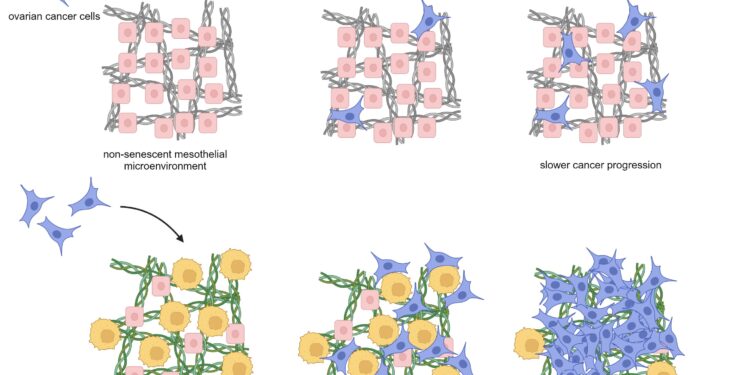The senescent mesothelial matrix attracts ovarian cancer cells, promoting their adhesion and spread. Credit: Ramray Bhat, created on biorender
Ovarian cancer is dangerous because it often goes unnoticed until it spreads beyond the ovaries, and symptoms can also be attributed to other conditions.
Scientists believe that aging may increase the spread of ovarian cancer and other cancers, but the underlying mechanisms are not entirely clear. Now, researchers at the Indian Institute of Science (IISc) have discovered that ovarian cancer cells can spread more easily in senescent or aged tissues because these tissues secrete a unique extracellular matrix that attracts the cancer which spreads.
The researchers used a model of chemotherapy-induced senescence to study this phenomenon. They first extracted tissue found in the walls of the body cavities of mouse models and exposed half of these tissues to chemotherapeutics used to treat cancer, pushing them into senescence, a state in which cells cease to replicate but do not die.
“What we might call the aging of a body, a cell or a tissue, we would call senescence,” explains Ramray Bhat, associate professor in the Department of Developmental Biology and Genetics (DBG). and corresponding author of the study published in Cellular and molecular life sciences.
The team then exposed tissues from young and old mice and sheets of cells resembling human tissue to ovarian cancer cells. They used time-lapse imaging to label normal and cancer cells with different fluorescent markers so they could be studied under a microscope for long periods of time.
“It is slightly more difficult to image tissues compared to cell lines, because the latter only has one particular cell type,” says Bharat Thapa, first author and former biology undergraduate at IISc. , who is currently pursuing a Ph.D. at Vanderbilt University, USA
What they found was that cancer cells chose to settle more in older tissues; moreover, they settled closer to the aged normal cells in the cell sheets.
To understand what attracted cancer cells to aged cells, the team first asked whether they were attracted to signaling molecules secreted by aged cells and distributed over long distances. They built computer models to explore the interactions between cancer cells and aged cells.
What they discovered was surprising: it was not the diffusing molecules that attracted the cancer cells. It is the proteins secreted by aged cells that take up residence as the extracellular matrix (ECM) – the basis on which cells adhere and grow – that call the cells cancerous. “The extracellular matrix is what brought the cancer cells there and allowed them to attach better near older cells and spread more quickly,” says Bhat.
The team also conducted experiments on human cell lines to reproduce the predictions of the computer simulations. They noticed that cancer cells adhere strongly to the extracellular matrix around aged cells and eventually eliminate the aged cells. They also noticed that the aged ECM had higher levels of proteins such as fibronectin, laminin and hyaluronan compared to the ECM of young cells, which allowed the cancer cells to bind more strongly.
Based on their results, the researchers suggest that this could potentially be one of the reasons why older populations generally tend to have worse cancer outcomes than younger populations. “The fact is that chemotherapy also induces senescence, and senescence can make things worse,” says Bhat. “Appropriate use of chemotherapy could be very important to achieve good outcomes in ovarian cancer.”
One solution, Bhat adds, could be to focus on finding probes that can identify some of these matrix proteins, which could help predict where cancer cells would settle in tissue.
Thapa also hopes that future studies will build a strong case for using senolytics – drugs that kill senescent cells – in combination with chemotherapeutics to fight cancer progression.
More information:
Bharat Vivan Thapa et al, Senescent mesothelial matrix accentuates colonization by ovarian cancer cells, Cellular and molecular life sciences (2023). DOI: 10.1007/s00018-023-05017-x
Provided by Indian Institute of Science
Quote: Aging cells could promote the spread of ovarian cancer, scientists say (January 16, 2024) retrieved January 16, 2024 from
This document is subject to copyright. Apart from fair use for private study or research purposes, no part may be reproduced without written permission. The content is provided for information only.



